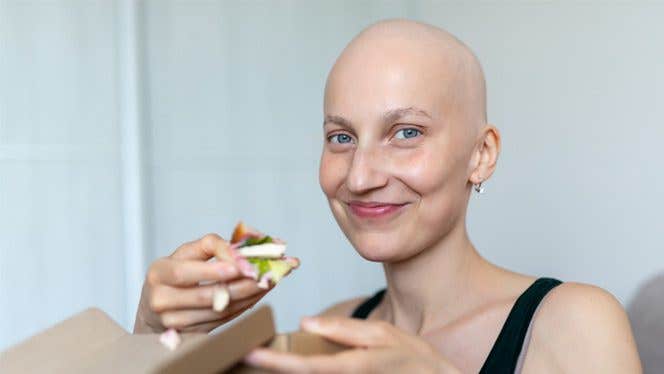
New Study: Plant-Based Diet Beats Ketogenic Diets for Cutting Cancer Risk, Improving Outcomes
A whole-food, plant-based (WFPB) diet is more effective than a ketogenic diet at reducing cancer risk and improving long-term health outcomes after cancer treatment, according to a new study published in JAMA Oncology.
The scientific review, conducted by Hematologic Oncologist Urvi Shah, MD, and Medical Oncologist Neil Iyengar, MD, of Memorial Sloan Kettering Cancer Center in New York City, explored the connection between food and cancer focusing on two popular dietary patterns: WFPB diet and ketogenic.
“There is currently no evidence to suggest that a particular diet on its own can treat cancer,” Iyengar explains. “However, growing evidence suggests that dietary interventions can reduce side effects from cancer treatments and could possibly help cancer treatments work better.”
Although the concepts behind a WFPB diet (which emphasizes whole, unrefined, or minimally refined plant foods and excludes or minimizes meat, dairy, and eggs) and a ketogenic diet (a low-carb, high-fat approach that tends to rely on animal foods) are diametrically opposite, Shah says examining the research to understand the differences is helpful.
In their review, Iyengar and Shah included 46 keto diet trials and eight plant-based diet trials. The studies included interventional studies—in which participants were assigned to a diet for a set period of time, with researchers measuring their biomarkers before and after each trial period—as well as epidemiological (population-based) studies. After reviewing the data collectively, they found that diets rich in whole plant foods were consistently associated with a reduced risk of developing and dying of cancer.
Clearing Up the Confusion
“Many of our patients ask about these two diets,” Shah says. “Patients sometimes question: ‘Are sugars bad? Do sugars cause the cancer to get worse?’ That’s why a keto diet may appeal to some patients. We also get many questions about a plant-based diet, as there is more awareness of the health benefits of plant foods, especially the importance of fiber, which is only derived from plants.”
Iyengar says there is a growing awareness of how lifestyle interventions, such as diet and exercise, can help fight diseases. “Most of the available data support a whole-food, plant-based diet over a ketogenic diet for reducing the risk of cancer,” he says. “The keto diet can be effective for weight loss. While weight loss is one important strategy for reducing cancer risk, there are many other variables that contribute to cancer risk—such as diet quality, fiber intake, and the bacterial composition in our gut. A plant-based diet is an effective strategy for addressing most of these variables in addition to weight loss.”
Following a cancer diagnosis, Iyengar says a WFPB diet still appears to be superior to keto. “Growing evidence suggests that dietary interventions can reduce side effects from cancer treatments and could possibly help cancer treatments work better,” he says. “There are ongoing clinical trials testing whether dietary interventions can help patients feel better while improving response to standard cancer treatments. In our paper, we call for more research in this area and we provide recommendations for designing successful trials.”
A Simple Rule
Hearing about different diets and food as medicine can be confusing and overwhelming. When in doubt, Shah recommends keeping a simple rule in mind: If a food is derived from plants and not processed, it will have beneficial effects on one’s overall health and risk of obesity, diabetes, and cancer.
“It is best to prioritize these foods, which include legumes, seeds, nuts, whole grains, fruits, and vegetables, and make them the bulk of your meals,” Shah says.
Want to try a plant-based diet but don’t know where to start? Visit our Beginner’s Guide.

About the Author

About the Author
Michelle McCarthy
Join our mailing list
Get free recipes and the latest info on living a happy, healthy plant-based lifestyle.
By providing your email address, you consent to receive newsletter emails from Forks Over Knives. We value your privacy and will keep your email address safe. You may unsubscribe from our emails at any time.